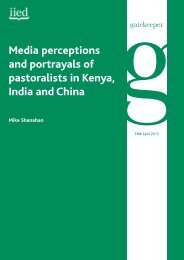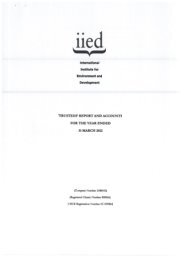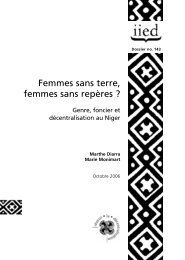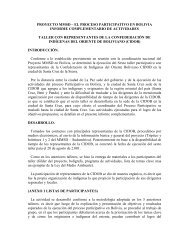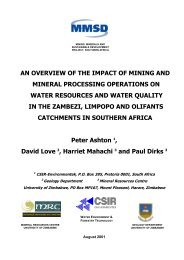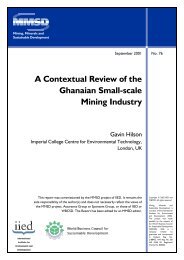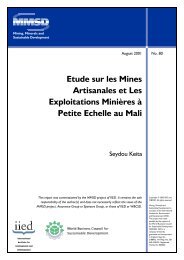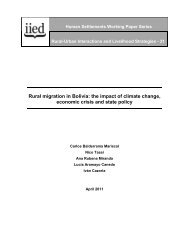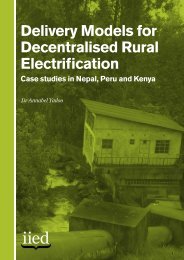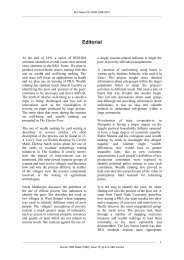Developing pro-poor markets for environmental services in the ...
Developing pro-poor markets for environmental services in the ...
Developing pro-poor markets for environmental services in the ...
You also want an ePaper? Increase the reach of your titles
YUMPU automatically turns print PDFs into web optimized ePapers that Google loves.
PAMB. 19 A broad set of guidel<strong>in</strong>es can be issued by each national government agency<br />
<strong>in</strong>volved, which should be coord<strong>in</strong>ated among <strong>the</strong>mselves first.<br />
The del<strong>in</strong>eation of an area <strong>in</strong>to a PA depends ma<strong>in</strong>ly on <strong>the</strong> natural configuration of its<br />
resources. Geological and ecological factors will come <strong>in</strong>to play. Hence, it is difficult to p<strong>in</strong><br />
down a specific number of members that can truly represent all stakeholders <strong>in</strong>volved <strong>in</strong> PA<br />
management. Some areas such as Mt Apo <strong>in</strong> Davao have demonstrated that PAMB<br />
membership can grow as big as 250 members. But because of <strong>the</strong> sheer size, it is very<br />
difficult <strong>for</strong> <strong>the</strong>m to meet regularly, fur<strong>the</strong>r delay<strong>in</strong>g discussions and agreements on pend<strong>in</strong>g<br />
issues. For areas such as Mt Apo, <strong>the</strong> PAMB should be flexible enough to create smaller<br />
groups that can be given jurisdiction on smaller areas with<strong>in</strong> <strong>the</strong> PA. The extent of autonomy<br />
<strong>for</strong> <strong>the</strong>se smaller groups will be on a case-by-case basis, depend<strong>in</strong>g on <strong>the</strong> nature of <strong>the</strong> issues<br />
to be resolved, and <strong>the</strong> capacity of <strong>the</strong> groups to act on <strong>the</strong>m.<br />
3.1.7 Conclusion<br />
The whole concept of <strong>the</strong> IPAF is new, although <strong>the</strong> law was passed ten years ago. It took<br />
time <strong>for</strong> <strong>pro</strong>tected areas under <strong>the</strong> system to be able to generate revenues on <strong>the</strong>ir own, a<br />
critical occurrence because of <strong>the</strong> traditional dependence on <strong>the</strong> national government <strong>for</strong> local<br />
budgets and funds. On <strong>the</strong> o<strong>the</strong>r hand, national government offices are still grappl<strong>in</strong>g with <strong>the</strong><br />
idea of lett<strong>in</strong>g go of major functions to local government entities, functions that have been<br />
traditionally and solely per<strong>for</strong>med at <strong>the</strong> national level. The Philipp<strong>in</strong>es has been undergo<strong>in</strong>g<br />
birth pa<strong>in</strong>s with respect to devolution and decentralisation <strong>for</strong> <strong>the</strong> past decade, and as<br />
expected, <strong>the</strong>re were <strong>pro</strong>blems along <strong>the</strong> way. Some departments have responded by<br />
reclaim<strong>in</strong>g control of certa<strong>in</strong> functions, while some have <strong>in</strong>creased <strong>the</strong> layers <strong>in</strong> <strong>the</strong><br />
bureaucracy <strong>for</strong> ensur<strong>in</strong>g checks and balances.<br />
The IPAF is no exception to this. The concept is groundbreak<strong>in</strong>g <strong>for</strong> <strong>the</strong> country <strong>in</strong> any case:<br />
now 75 per cent of revenues generated from PAs will go directly <strong>in</strong>to <strong>the</strong> area’s own<br />
management and <strong>pro</strong>tection. Experiences on IPAF requests have been new and far too few.<br />
Only those that have actually been able to generate <strong>the</strong>ir own revenues have had such<br />
experience. It can be <strong>in</strong>ferred that such PAs are <strong>the</strong> more advanced ones at least <strong>in</strong> terms of<br />
management, thus one would expect <strong>the</strong>m to be able to implement <strong>the</strong>ir <strong>pro</strong>grammes and<br />
<strong>pro</strong>jects <strong>in</strong> an efficient manner. There is <strong>the</strong> hope <strong>for</strong> susta<strong>in</strong><strong>in</strong>g economic development<br />
without sacrific<strong>in</strong>g <strong>environmental</strong> and natural resource management. However, release of<br />
budgets have been bogged down by <strong>the</strong> long <strong>pro</strong>cess and numerous signatures <strong>in</strong>volved. As<br />
such, delays <strong>in</strong> implement<strong>in</strong>g <strong>the</strong>ir WFPs have been long and drawn out.<br />
The options <strong>in</strong> this report are meant to ensure that such efficiency is not hampered by<br />
circumstances not under <strong>the</strong> control of <strong>the</strong> PA management bodies. It is hoped that efficiency<br />
does not get lost along <strong>the</strong> way because of fears of unscrupulous local managers gett<strong>in</strong>g <strong>the</strong><br />
better of <strong>the</strong> national government. If at all, such efficiency should even be rewarded to serve<br />
as <strong>in</strong>centives <strong>for</strong> o<strong>the</strong>rs to emulate. The answer lies <strong>in</strong> stricter monitor<strong>in</strong>g <strong>pro</strong>cedures and a<br />
stronger penalty system <strong>for</strong> would-be violators and abusive PA managers.<br />
19 The NIPAS Act specifies <strong>the</strong> DENR regional director as chairperson of <strong>the</strong> PAMB.<br />
46



